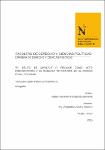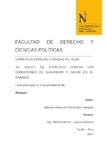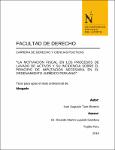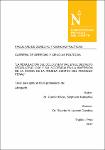Mostrar el registro sencillo del ítem
El delito de marcaje o reglaje como acto preparatorio y su indebida tipificación en el código penal peruano
| dc.contributor.advisor | Urtecho Navarro, Alejandro | |
| dc.contributor.author | Hidalgo Bustamante, Rafael Alejandro | |
| dc.date.accessioned | 2016-11-30T21:58:09Z | |
| dc.date.available | 2016-11-30T21:58:09Z | |
| dc.date.issued | 2015-11-16 | |
| dc.identifier.citation | Hidalgo, R. A. (2015). El delito de marcaje o reglaje como acto preparatorio y su indebida tipificación en el código penal peruano (Tesis de licenciatura). Repositorio de la Universidad Privada del Norte. Recuperado de https://hdl.handle.net/11537/7988 | es_PE |
| dc.identifier.other | 345 HIDA | es_PE |
| dc.identifier.uri | https://hdl.handle.net/11537/7988 | |
| dc.description.abstract | RESUMEN El presente trabajo de investigación tiene como finalidad desarrollar de qué manera la discrecionalidad legislativa para sancionar actos preparatorios, expresada con la incorporación del delito de Marcaje o Reglaje en el Código Penal Peruano, afecta los Principios que conforman el Ius Puniendi Estatal; esto en razón a que como se tiene entendido un acto preparatorio según doctrina no puede ser sujeto de punibilidad y al hacerlo se estaría dando un adelantamiento innecesario de las barreras de intervención punitivas del derecho penal, debido a que los comportamientos que realizan los agentes se encuentran muy lejanos a la etapa ejecutiva del injusto penal, necesarios para la perpetración de la figura delictiva, los mismos que en esta fase, resultan inocuas e irrelevantes para el derecho penal, siendo que durante todo este proceso, se produce la vulneración de varios principios penales, como el de Lesividad, Intervención Mínima del Derecho Penal y Proporcionalidad. En el primer capítulo, vamos a detallar el problema investigado, describiendo la realidad problemática por la cual se creó dicho problema, veremos cuáles son nuestras limitaciones y que objetivos nos trazamos en la presente investigación. En el segundo capítulo, referido al marco teórico, primero estudiaremos la estructura típica y normativa del delito de Marcaje o Reglaje para luego continuar con los límites al Ius Puniendi, donde puntualizaremos los principios penales que se verían afectados con la incorporación del Marcaje en el Código Penal. Finalmente analizaremos la Política Criminal del Estado Peruano, en donde veremos, que en sí no existe una política criminal en nuestro país, o si esta existe es circunstancial, depende de los hechos o problemas sociales del momento, no mira a futuro ni las otras implicancias que tendría la legislación de tales hechos, tal como sucede en el delito de Reglaje. En el tercer capítulo, veremos los materiales y métodos de nuestro trabajo de investigación, siendo ésta una investigación correlacional causal, teniendo como unidad de estudio la fuente bibliográfica, debido a que es una investigación netamente teórica. En cuanto a los métodos utilizados fueron la investigación bibliografía, la observación, el estudio de casos y la entrevista. En los dos capítulos finales subsiguientes cuatro y cinco, los cuales se refieren a los Resultados y su Discusión, se analizó la sentencia N° 02795-2013-44 del Noveno Juzgado Penal Unipersonal de Trujillo, la cual es la única sentencia consentida existente en La Libertad respecto al delito de Marcaje o Reglaje y se entrevistó a cinco especialistas del Derecho Penal y Procesal Penal de distintos ámbitos laborales. En cuanto a la discusión de la sentencia analizada, se pudo identificar que aún no se tiene claro el sentido y el uso práctico del delito de Marcaje; esto se ve reflejado en la pobre fundamentación jurídica y el ambiguo y vago razonamiento del fiscal al momento de fundamentar su teoría del caso. Y de la discusión de las entrevistas, se pudo corroborar la investigación realizada en la presente tesis, ya que los especialistas al ser consultados, muchas veces tenían opiniones que afirmaban lo estudiado en esta tesina. Por lo que se llegó a la conclusión final que la discrecionalidad legislativa para sancionar actos preparatorios, expresada con la incorporación del delito de Marcaje o Reglaje en el Código Penal Peruano, afecta los principios que conforman el Ius Puniendi estatal al trasgredir los Principios de Lesividad, Mínima Intervención del Derecho Penal y Proporcionalidad. | es_PE |
| dc.description.abstract | ABSTRACT In the present research was developed how the legislative discretion to punish preparatory acts, expressed with the inclusion of the crime of marking or adjustment in the Peruvian Criminal Code affects the Principles that form the Ius State puniendi; this for the reason that as it is understood a preparatory act according doctrine can not be punibilizado and in doing so would be giving an unnecessary overtaking barriers punitive intervention of criminal law, because the behaviors performed by agents are far away the executive stage of the criminal unjust, necessary for the commission of the offense, the same that at this stage, are safe and irrelevant to criminal law, being that throughout this process, violating several criminal principles occur as that of harmfulness, Minimal Intervention Criminal Law and proportionality. In the first chapter, we will detail the research problem, describing the problematic fact that this problem was created, we will see what our limitations and goals we set for ourselves in this investigation. In the second chapter, based on the theoretical framework, first we study the typical structure and regulation of the crime of marking or adjustment and then continue with limitus the right to punish, which will point the criminal principles that would be affected by the incorporation of marking in the Code criminal. Finally we analyze the Criminal Policy of the Peruvian State, where we see that there is not itself a criminal policy in our country, or if there is circumstantial, depends on the facts or social problems of the moment, not looking to the future and other implications that such legislation would have made, such as in the crime of adjustment. In the third chapter, we will see materials and methods of our research, this being a causal correlational research, with the unit of study the source, because it is a purely theoretical research. As for the methods included literature research, observation, case studies and interviews. In the subsequent two final chapters four and five, which refer to the Results and Discussion, Case No. 02795-2013-44 the Ninth Criminal Court analyzed Trujillo Unipersonal, which is the only existing in the Consent Decree freedom from crime or adjustment Marking and five specialists from the Criminal Law and Criminal Procedure different work environments were interviewed. As for the discussion of the judgment analyzed, could be identified which do not have yet clear sense and practical use of the crime of Mark, this is reflected in the poor legal reasoning and the ambiguous and vague reasoning of the prosecutor to investigate. And the discussion of the interviews, it was possible to corroborate the research in this thesis, as the specialists to be consulted, often had opinions that claimed it studied in this thesis. So it came to the final conclusion that the legislative discretion to punish preparatory acts, expressed with the inclusion of the crime of marking or adjustment in the Peruvian Penal Code affects the principles that make up the right to punish state to transgress the principles of harmfulness and minimum intervention of criminal law. | es_PE |
| dc.description.uri | Tesis | es_PE |
| dc.format | application/pdf | es_PE |
| dc.format | application/msword | es_PE |
| dc.language.iso | spa | es_PE |
| dc.publisher | Universidad Privada del Norte | es_PE |
| dc.rights | info:eu-repo/semantics/openAccess | es_PE |
| dc.rights | Atribución-NoComercial-CompartirIgual 3.0 Estados Unidos de América | es_PE |
| dc.rights.uri | https://creativecommons.org/licenses/by-nc-sa/3.0/us/ | * |
| dc.source | Universidad Privada del Norte | es_PE |
| dc.source | Repositorio Institucional - UPN | es_PE |
| dc.subject | Código penal | es_PE |
| dc.subject | Derecho penal | es_PE |
| dc.subject | Derecho procesal penal | es_PE |
| dc.title | El delito de marcaje o reglaje como acto preparatorio y su indebida tipificación en el código penal peruano | es_PE |
| dc.type | info:eu-repo/semantics/bachelorThesis | es_PE |
| thesis.degree.grantor | Universidad Privada del Norte. Facultad de Derecho y Ciencias Políticas | es_PE |
| thesis.degree.level | Título Profesional | es_PE |
| thesis.degree.discipline | Derecho y Ciencias Políticas | es_PE |
| thesis.degree.name | Abogado | es_PE |
| dc.publisher.country | PE | es_PE |
| dc.subject.ocde | https://purl.org/pe-repo/ocde/ford#5.05.01 | es_PE |
| thesis.degree.program | Pregrado | es_PE |
| dc.description.sede | Trujillo El Molino | es_PE |
| renati.advisor.dni | 41942908 | |
| renati.author.dni | 44444589 | |
| renati.discipline | 421056 | es_PE |
| renati.level | https://purl.org/pe-repo/renati/level#tituloProfesional | es_PE |
| renati.type | https://purl.org/pe-repo/renati/type#tesis | es_PE |
Ficheros en el ítem
Este ítem aparece en la(s) siguiente(s) colección(ones)
-
Tesis [833]








